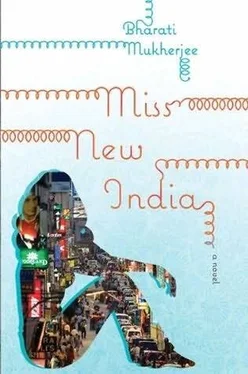How could she explain to Mr. Champion how difficult-how impossible-it was for a daughter in a family like hers to just up and leave town except as the bride of a man her father had hand-picked? Why did family honor and fatherly duty involve his shackling her to a stranger when he had already proved himself so fallible? It was her life he was threatening to ruin next. Her father had a simple explanation: "It is not a question of happiness, yours or ours. It's about our name, our family reputation." Even at nineteen, Anjali was determined not to yield her right to happiness.
Mr. Champion, oblivious to what she had to contend with at home, was back to smiling. Maybe all Americans were inscrutable in that way. You couldn't tell what they really thought. Maybe he hadn't noticed her little lie; maybe he'd noticed but forgiven her. She sailed through life with a blithe assumption that she would be forgiven.
"Remember what I told you. India's leaving towns like this in the dust. You've got prospects." He shifted a heavy jute shopping sack strapped to the back seat of his scooter and patted the empty space. An overripe orange tumbled out of the bag into the gutter. Two crows and a pariah dog zeroed in on the smashed fruit. "Hop on, Angie."
If Gauripur was that doomed, why hadn't he left?
"I'll give you a ride to your house if you don't mind stopping off at my place while I put this stuff away." He retightened the strap around the jute sack. "There's fish at the bottom."
She liked the idea of not having to go right back home to her father's bullying and her mother's tearful silence. They were obsessed with finding a respectable son-in-law who would overlook negatives such as green eyes, a stubborn personality, and a nominal dowry. Her father blamed her for his lack of matchmaking success. Usually he pointed to her T-shirts and jeans: "What you wear, how you talk, no wonder! What good boy is going to look twice?"
Plenty, Baba, she could have retorted but didn't. She was not lacking for admirers. Boys were attracted to her, though she did little enough to encourage them. She knew what her father meant, though: prospective bridegrooms-"good boys" from good families-would back off.
With her sandaled toe, Angie traced a deep dent on Mr. Champion's scooter. The strappy sandal was the same shade of lilac as her painted toenails. She knew she had pretty feet, small, high-arched, narrow. He had to have noticed. "Looks like you need a new set of wheels, Mr. Champion," she teased.
The American wiped the passenger seat with the sleeve of his kurta. "Don't wait until it's too late."
He didn't understand her struggles; how could any aging, balding American with tufts of nose hair do so? She had one, and only one, legitimate escape route out of Gauripur: arranged marriage to a big-citybased bridegroom. That B. Comm. degree would increase her stock in the marriage market.
"Okey-dokey, Mr. Champion." She laughed, easing herself in place beside the jute sack on the passenger seat. Let the sidewalk throngs stare; let the crowds part for the young unmarried woman on the back of the bachelor American's scooter. When the word got out, as it inevitably would, that Anjali Bose, daughter of "Railways Bose" of Indian Railways, sister of a working-woman divorcee, was riding off in plain sight, with her arms around the stomach of a foreigner, her parents would find it harder to make a proper-caste Bengali matrimonial match for her. So be it.
"And I've got someone I'd like you to meet," he said.
"You are inviting me to go to your flat, Mr. Champion?" She tried not to sound shocked.
It would not be her first visit to her teacher's home. Mr. Champion offered an English conversation course on Saturday mornings, and an advanced English conversational skills course on Sunday afternoons, at his apartment. Anjali had completed both courses twice, as had a dozen ambitious male da Gama students hoping to improve their chances of getting into professional schools in engineering or medicine or business management. A few of Mr. Champion's students were now doctors in their early thirties, waiting for immigrant visas to Canada or Australia.
The very first time Anjali showed up for Mr. Champion's Saturday conversation class, she had been severely disappointed with how little he owned in the way of furniture and appliances. No refrigerator, no television, no air conditioner, no crates of carbonated soft drinks. He owned a music system, professional-looking tape-recording equipment, and a bulky laptop and printer. Wooden office chairs and a pile of overstuffed cushions served as extra seating. Dozens of Indian books in every language were stacked on a brick-and-plank bookcase. A divan that surely doubled as his bed was pushed alongside a wall. Anjali had expected a professor's home to be shabby, but a shabby portal of learning, crammed with leather-bound books by world-renowned authors.
Anjali had been the only girl in those classes. She had been brought up to revere her elders and teachers, but whenever she visited Mr. Champion's place, she'd imagined his shame: the rooms were so barren, so like a servant's quarters. Some Saturday afternoons the sheets on the divan still looked mussed. She was embarrassed to be in a room with a man's bed, with his clothes hanging from pegs on a wall as though he had undressed in front of her. His apparent loneliness depressed her; his exposure agitated her. The silence of Mr. Champion's room made the beehive drone of an Indian family seem less insane. She was not much of a homebody-according to her mother's complaints-but if it hadn't seemed too forward a gesture by the only girl student, she would have brought her teacher small house gifts, a flower vase or just a wall calendar, to make the room look cozier.
Now terra-cotta pots of blooming flowers lined the narrow walkway to Mr. Champion's back staircase. Vines hung over the stairwell, and the stairs themselves were fragrant with flowers she couldn't name in any language. Could it be the same place?
"Mr. Champion! Have you gotten married?" She laughed, and from the top of the stairs he turned to her with a smile.
"Some difference, wouldn't you say?"
The door was painted bright blue. It opened inward before he could even insert the key. By then, Anjali had gained the top step, and there she faced a young man wrapped in a lungi, bare-chested, rubbing his eyes. "Jaanu," he said in a low voice, and Mr. Champion said a few words in what sounded like Urdu. Angie made out the universal "tea" and "biscuits" and maybe a version of her name.
There were cut flowers on a round table, a colorful tablecloth, and paintings nailed to the walls. There were two comfortable-looking cane chairs and a floor lamp. An old wooden almirah now held the clothes that had been hung on pegs, and bookcases ran along every wall, right up to the sleeping alcove. The bed was not made, almost as though the boy had been sleeping in it. She didn't see his sleeping mat. "Angie, this is Ali," said Mr. Champion. Then he added, "He is my friend."
Americans can do that, she thought: make friends of village Muslims. Young Ali, Mr. Champion's jaanu, his life (if the Hindi and Urdu words were congruent in meaning), a handsome enough boy if nearly black, with long hair and flaring cheekbones, had painted his fingernails bright red. He opened the almirah to find a shirt for his half-naked body. Either the shirt had been donated by Mr. Champion but still hung in the master's closet, which was cheeky enough-or else the two men shared closet space, which to her was unthinkable.
Mindful of parental wrath if she was to return home on the back of a man's bike, Anjali insisted that she would stay only a few minutes and then take a bus back. If Baba or the nosy neighbors saw her get off the bus at the stop close to home, they would suspect nothing. She wasn't ready for a screaming match with Baba. But she stayed an hour, speaking more freely of her longings than she did with her girlfriends. She didn't want marriage. Her classes were dull. She wanted something exciting, life-changing, to save her from the tedium of Gauripur. "I understand," Mr. Champion said. Ali was sent off to buy sweets. Angie had been Peter Champion's fondest project, someone very much like him, he said, who couldn't live in the small town of her birth. What a pain it is, to know that one is somehow fated to set sail for the farthest shore. "What a calling it is for someone like me," he joked, "to fill that ark with passengers."
Читать дальше












